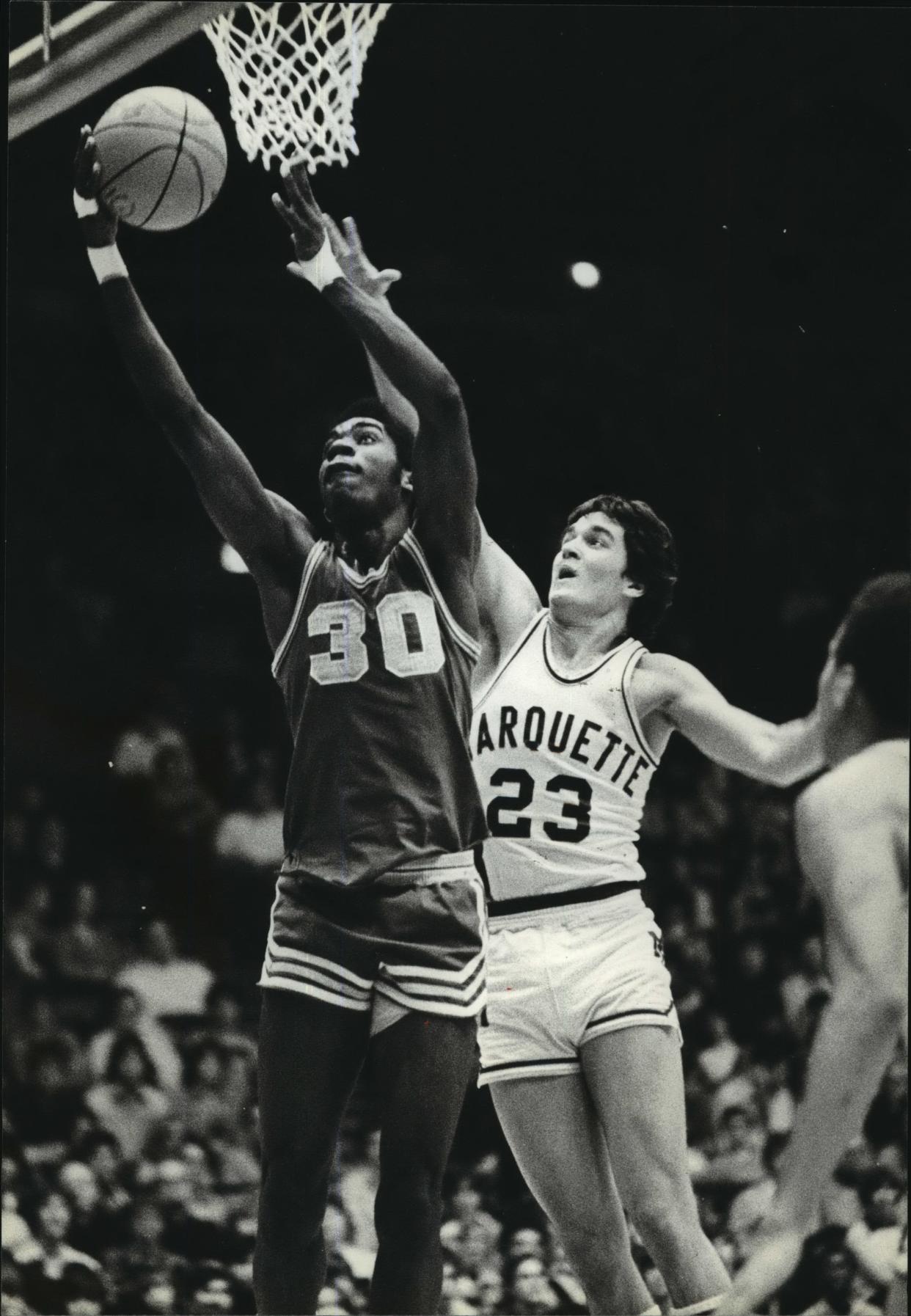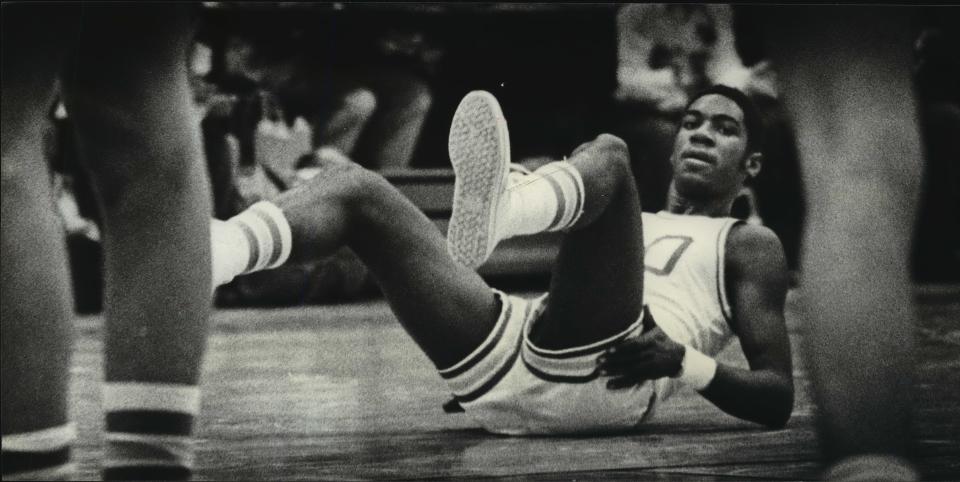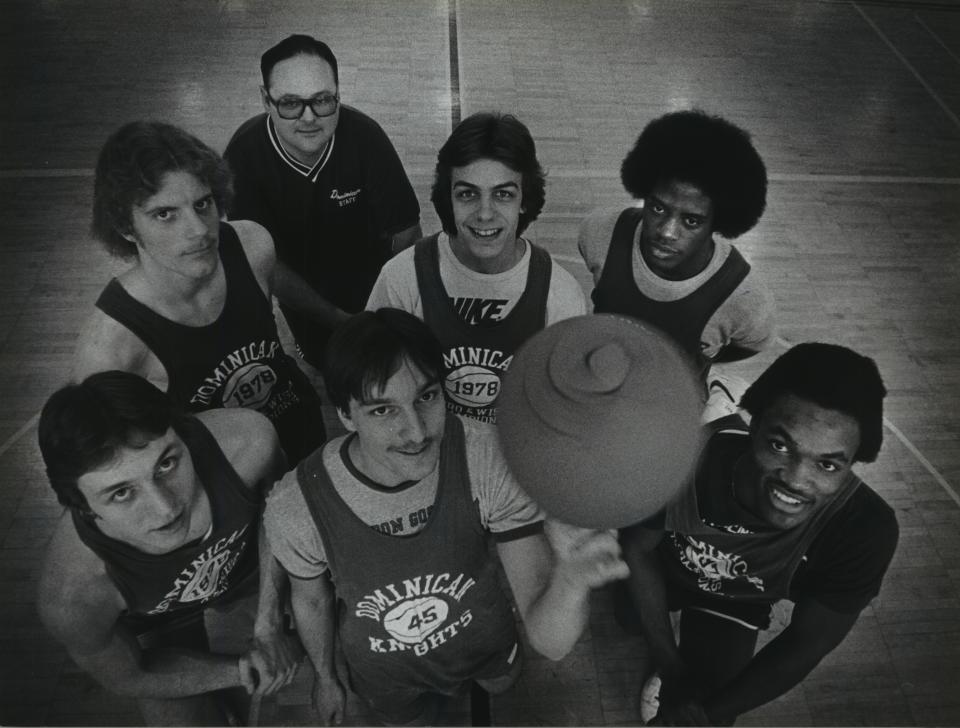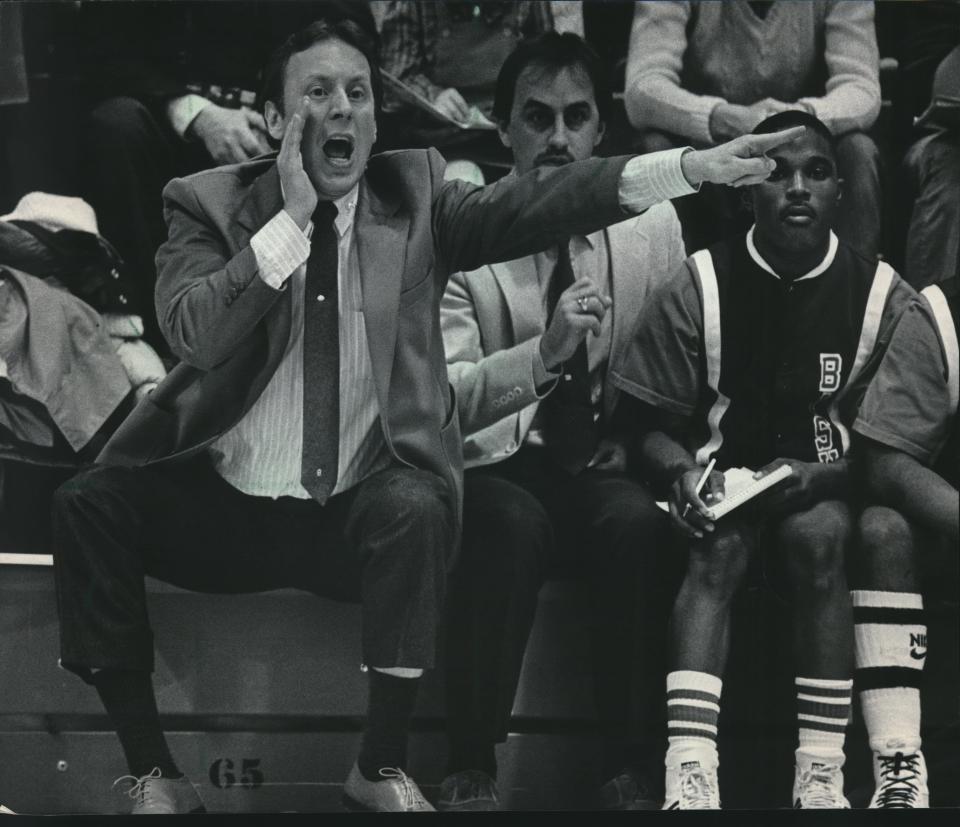Thomas More basketball and the courts? More than four decades ago, another case captivated Wisconsin

This isn't the first time the St. Thomas More basketball team's postseason has been resuscitated by a different court system entirely.
The Cavaliers returned to the WIAA postseason after a judge's ruling essentially overturned the WIAA's decision to disqualify varsity players from a regional final following a fight that broke out in their playoff battle with Fuller Collegiate Academy on March 4.
After it was given new life, Thomas More won its regional final Thursday night against Brown Deer and will play a sectional semifinal Friday.
It's been more than 40 years, but longtime Wisconsin basketball fans will remember another high-profile case centered around Nigel Wallace, whose eligibility came under question as Thomas More prepared to play in the 1980 Wisconsin Independent Schools Athletic Association state tournament.
Wallace, a 6-foot-4 junior, transferred to the area from DeWitt Clinton High School in the Bronx, a move catalyzed by New York mentor Joe Bostic, who had redirected many kids from New York to Milwaukee for the opportunity to pursue basketball — many at St. John's Northwestern Military Academy in Delafield.
More: Its WIAA appeal request denied, St. Thomas More will go to court over basketball forfeit
Wallace moved in with Marquette University professor Tim Rueth, who agreed to become Wallace's guardian. Wallace elevated Thomas More to championship-caliber, but the day after earning the state tournament berth, the now-defunct WISAA ruled Wallace ineligible and that Thomas More would have to forfeit all its wins. Kenosha St. Joseph was sent to take Thomas More's place.
The story, of course, didn't end there.
Missing paperwork raised a red flag

At issue was the official paperwork giving Rueth guardianship — specifically, there was none.
Instead, Bostic had obtained a signed agreement from Wallace's father and in turn issued his own signed agreement giving Rueth guardianship. Both were notarized but not delivered to Milwaukee until Feb. 28 during the postseason run, and the notary was Bostic's attorney brother.
No court ever officially declared that Rueth was Wallace's guardian. WISAA rules stated that without official guardianship, a player who transferred from a non-member school had to enroll no later than 17 days from the start of the school year to be eligible for athletics that semester.
Wallace left New York after his mother died and didn't get to Thomas More until October.
Thomas More initially took Rueth and Wallace at their word that Rueth had legal guardianship, and the WISAA in turn took Thomas More's word, ruling Wallace eligible. But when Thomas More senior official Brother Joseph Grieshaber perused documents the Thursday before the team's regional games, he realized he was missing official documentation of the relationship. Rueth said he didn't have any reason to doubt the legitimacy of the relationship, but multiple attempts to secure actual paperwork from New York had gone without anything arriving. At some point, he stopped worrying about it.
Grieshaber waited until Sunday to report the issue to the WISAA, after word of mouth about the situation had spread and a Milwaukee Journal reporter began asking questions. School officials believed they'd be forced to forfeit the games in the first semester, but that Wallace would be eligible for everything after. Instead, the WISAA levied a harsher penalty, citing the school's use of the ineligible player in the first semester as justification for wiping away the entire slate of wins.
Dominican's 62-game winning streak ... is it snapped or not?

Not only would that keep Thomas More out of the state tournament, it would call into question a monumental Jan. 28 one-point win over Dominican, which snapped the Whitefish Bay powerhouse's 62-game winning streak, a record for boys basketball. Wallace scored 32 points in the win.
"Technically, it may be intact, but as far as Dominican is concerned and our players are concerned, we lost that game," legendary coach Don Gosz said afterward. "We should have won that game, but we didn't. They can continue the streak on, but as far as I'm concerned, it is 62 games overall and 42 in conference."
With that loss turned to a forfeit, the streak would technically inflate to 73 victories and 51 in conference.
"Why wasn't this all done in November?" Gosz asked. "I just feel sorry for the kids at Thomas More, because they had never played in a state tournament and had a great season, and now they can't go."
Thomas More parents take the issue to court

Thomas More coach Mike Fons believed the punishment didn't fit the crime.
"We realized Nigel had been ineligible the first semester, and we were ready to bite that bullet," he said. "After the first semester, we were 2-2 in the Metro Conference and 6-2 overall, and we figured we would just have to forfeit those games. It was a shock to get the additional penalty."
Though a U.S. District Court judge initially denied a request by Thomas More parents for a temporary restraining order on technical grounds, Circuit Court judge William A. Jennaro agreed that the Cavaliers should be allowed to play. A last-ditch appeal by the WISAA was denied less than an hour before the start of the Friday tournament at the Milwaukee Arena and three hours before the first game involving Thomas More.
"The harm to the plaintiffs/athletes in this case far outweighs any supposed harm to the respondent (WISAA)," wrote Jennaro, whose order suggested that the parents had enough of a case to allow for temporary relief. He also noted that Rueth demonstrated he had, in fact, served faithfully as Wallace's guardian.
Thomas More took the floor, and Wallace delivered 25 points in the quarterfinal, topping St. John's in overtime, 65-58. In the semifinal, Wallace scored 21 points against Appleton Xavier, although he injured his hand in a 49-43 win.
The championship game would come against Marquette, featuring a coach who was among those not happy at all about the Wallace situation.
Fingers pointed in many directions, including at potential whistleblowers
Bill Dwyre, the Milwaukee Journal sports editor who became sports editor of the Los Angeles Times in 1981, took the WISAA to task in his column.
"The WISAA seems to have ... looked no deeper than a bunch of words in a rulebook, allowed for no flexibility, perspective, hindsight or foresight in its judgment making, and taken a course of spineless backpedaling.
"That function must be to administer high school athletics with such a blend of fairness, logic and decisiveness that the maximum educational benefits are acquired by the participants."
Marquette coach Paul Noack, who'd been among those accused by the public of whistleblowing on Wallace, was incensed that Thomas More was allowed to keep playing. The two schools, both all-boys schools at the time, already had a fierce rivalry.
"The people at Thomas More have no integrity; they're dishonest," he was quoted in the Milwaukee Journal as saying, though he later softened those remarks to say, "What I meant was that, at this point, I'm questioning how honest they are being. My school, my players, myself, have taken a lot of abuse, phone calls, language you wouldn't believe, and mostly from adults. Because the true facts have not been brought to light, the blame is being placed elsewhere. It's an internal problem for Thomas More to handle."
The Milwaukee Journal connected the dots this way: Rueth had spoken to St. John's coach Gary Richert on a Thursday, suggesting that Thomas More was expecting to report what it found. Richert repeated the news to Noack while both attended a Saturday playoff game. Noack, in turn, repeated the news to a Pius assistant at the game, and a student overhearing the conversation called the Journal sports desk, at which point the assignment was given to reporter Mary Schmitt. Her series of phone calls began alerting those involved that there might be a problem.
"We didn't do anything wrong. It was just a misunderstanding that occurred," Fons said. "Nobody did anything purposely to try to hide, finagle anything. It's something I hope I never have to go through, or anyone else has to go through. Because it was hell on earth for a while."
Marquette's state final against Thomas More became a must-see
Marquette first defeated Dominican in the semifinal on Ray Fox's 17-footer with 6 seconds left, providing a true-streak ender that needed no asterisk.
The next night, the Hilltoppers topped Thomas More for the Class A title, 52-47, but it came down to the wire, clinched when Jim Rosenberger hit two free throws with 11 seconds left. More than 8,000 fans were on hand for the highly anticipated contest. Afterward, Noack accused Fons of not shaking his hand.
"I really feel, when the judge made his decision, that we had to win it here," Noack said afterward. "I didn't want to win on a reversal later."
WISAA eventually gets what it wants in settlement
The court case continued into the following February, and the WISAA and a Thomas More parent group reached a settlement in federal court. Stipulated therein was an acknowledgment that the WISAA acted within the powers of its bylaws and its constitution. Thomas More got to keep its second-place finish, though all its wins during the season were re-classified as forfeits except for the two in the state tournament. Officially, the Cavaliers finished 2-23 instead of 21-4.
Marquette won the following year's title, too, defeating Thomas More in overtime of the state semifinal, 48-46. The WISAA dissolved and schools were merged into the Wisconsin Interscholastic Athletic Association, beginning in the 2000-01 season.
Wallace, who was considered a junior that season but who already had eight semesters of school and wasn't eligible to play another season at Thomas More, transferred to a junior college in Los Angeles. He then enjoyed a fruitful career at Chapman College (now Chapman University) in Orange, California, where he starred for two years.
He averaged 14.4 points, 7.7 rebounds and 4.9 assists as a senior and finished with a career field-goal percentage of 54.6, earning all-district and all-NCAA Division II West Regional Team. The coach of that team, former UCLA star Walt Hazzard, went on to coach UCLA after the 1983-84 season.
JR Radcliffe can be reached at (262) 361-9141 or jradcliffe@gannett.com. Follow him on Twitter at @JRRadcliffe.
Our subscribers make this reporting possible. Please consider supporting local journalism by subscribing to the Journal Sentinel at jsonline.com/deal.
DOWNLOAD THE APP: Get the latest news, sports and more
This article originally appeared on Milwaukee Journal Sentinel: Court ruling in 1980 allowed Thomas More to keep playing basketball

